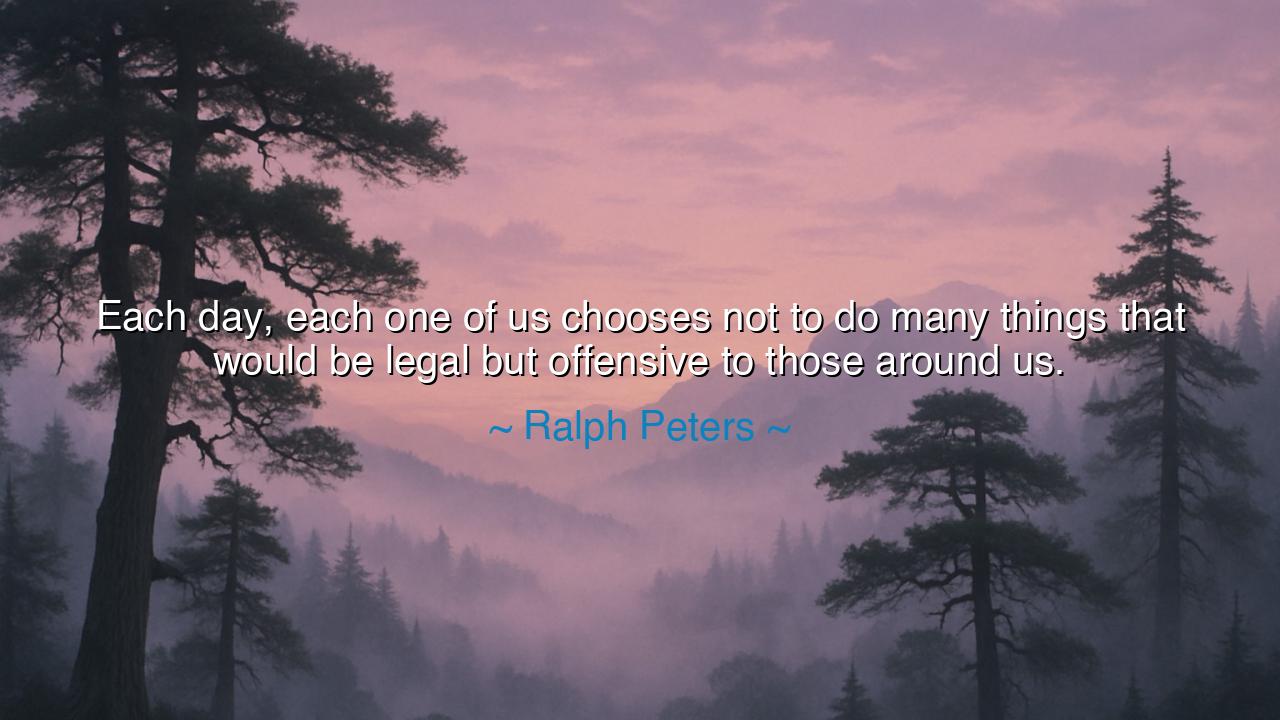
Each day, each one of us chooses not to do many things that would
Each day, each one of us chooses not to do many things that would be legal but offensive to those around us.






There are words that cut through the noise of the age like the toll of a great bell — words that remind us that morality is not written only in law, but in the silent choices of the heart. When Ralph Peters said, “Each day, each one of us chooses not to do many things that would be legal but offensive to those around us,” he was pointing to the invisible discipline that holds civilization together — the self-restraint that flows not from coercion, but from conscience. His words remind us that legality alone cannot sustain harmony, for the law governs the body, but ethics govern the soul. What is allowed is not always right, and what is forbidden is not always evil. Between these realms lies the sacred ground where character is tested — the realm of choice.
The origin of this quote can be found in Peters’ reflections on the relationship between law, morality, and personal responsibility. A soldier, strategist, and writer, Peters understood that no society can legislate virtue. He had seen firsthand how, in times of war and politics, men often use legality to excuse cruelty. His statement came as a sober reminder that freedom demands restraint, and that the strength of a nation is not measured by the breadth of its laws, but by the depth of its citizens’ decency. When he spoke these words, he was not preaching conformity, but wisdom — a call to remember that the truest order comes not from compulsion, but from the voluntary respect one person shows another.
This truth has echoed through every age of humanity. The ancients knew that laws are only the outer walls of virtue — that beyond them lies the inner fortress built by habit, honor, and empathy. Aristotle, in his teachings on ethics, said that virtue is not the product of law, but of practice — that a man becomes just by doing just things. Laws may prevent crime, but only conscience prevents cruelty. Peters’ quote reminds us that every day, in small and silent ways, we maintain peace not because the law commands it, but because our hearts do. We do not insult a stranger, though it may be our right to speak freely. We do not mock the grieving, though no rule forbids it. We do not flaunt our triumphs before the broken, though it costs us nothing to do so. This unseen discipline is the moral glue of civilization, stronger than any court or code.
Consider, for example, the story of George Washington, the general who became the first President of the United States. At the height of his power, when the army could have made him king, he chose instead to lay down his sword and return to private life. No law forced this humility — in fact, the law would have permitted his coronation. But he knew that to seize the crown would be legal, yet offensive to liberty itself. His choice, born not of law but of virtue, preserved the fragile dream of democracy. History remembers him not because of what he did, but because of what he chose not to do. This is the living essence of Peters’ insight: that the greatness of individuals — and nations — lies as much in their restraint as in their action.
Peters’ words also serve as a quiet rebuke to the modern age, where people often mistake rights for righteousness. We live in a time when many shout, “I am free to do as I please,” yet few ask, “But should I?” Freedom without responsibility is chaos disguised as liberty. The wise understand that true freedom is the mastery of the self, not the indulgence of impulse. Just because something is permitted does not make it noble; just because a path is open does not mean it should be walked. The ancients likened this to the difference between power and wisdom: power is the ability to act; wisdom is knowing when not to. Peters’ quote invites us to live with that same awareness — to govern ourselves before demanding to be governed by others.
His statement also carries within it a message of compassion. To refrain from what is offensive to others, even when permitted, is to live in awareness of the shared fabric of humanity. It is the quiet act of kindness that builds trust, the unseen gesture that preserves friendship. This restraint is not weakness — it is strength under control, like the warrior who sheaths his sword though victory is within reach. For every day we live among others, we must remember that society is not sustained by rules alone, but by the respect that flows between hearts. Each time we choose courtesy over cruelty, patience over pride, understanding over judgment, we honor that ancient covenant of coexistence.
So let this wisdom be handed down to those who come after us: do not measure right by what is legal, but by what is honorable. The law can guide your steps, but only conscience can guide your soul. Every day offers countless choices — some permitted by law, but forbidden by virtue. In those moments, choose restraint, for that is the mark of the truly free. As Ralph Peters reminds us, civilization endures not because of the laws written in books, but because of the virtues written in the hearts of those who live by them. And so, let each person strive to be the unseen guardian of harmony, proving that the highest form of power is not in doing what one can, but in choosing what one ought.






AAdministratorAdministrator
Welcome, honored guests. Please leave a comment, we will respond soon